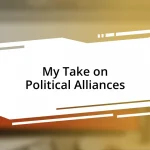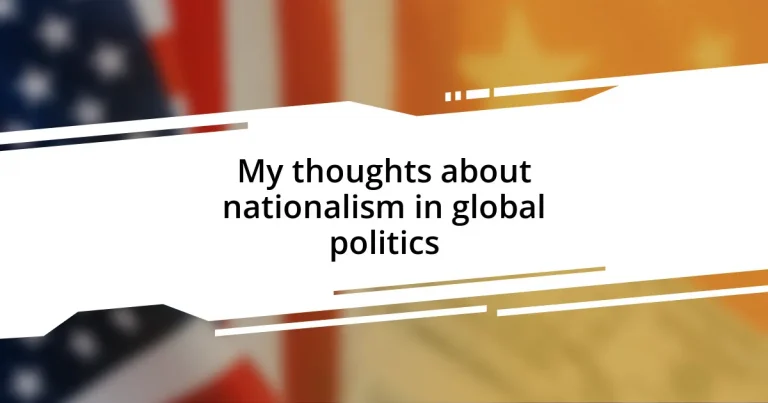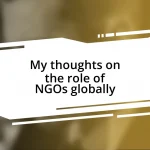Key takeaways:
- Nationalism fosters a shared identity, creating unity but also potential exclusion and conflict in global relations.
- The historical evolution of nationalism highlights its dual-edged nature, impacting community and political landscapes by intertwining local pride with global interconnectedness.
- Contemporary nationalism serves as both a protective force for local interests and a potential barrier to globalization, creating tensions around cultural exchange and economic collaboration.
- The future of nationalism may involve redefining identities in light of technological advances, increased migration, and environmental concerns, prompting a complex interplay between national pride and global solidarity.
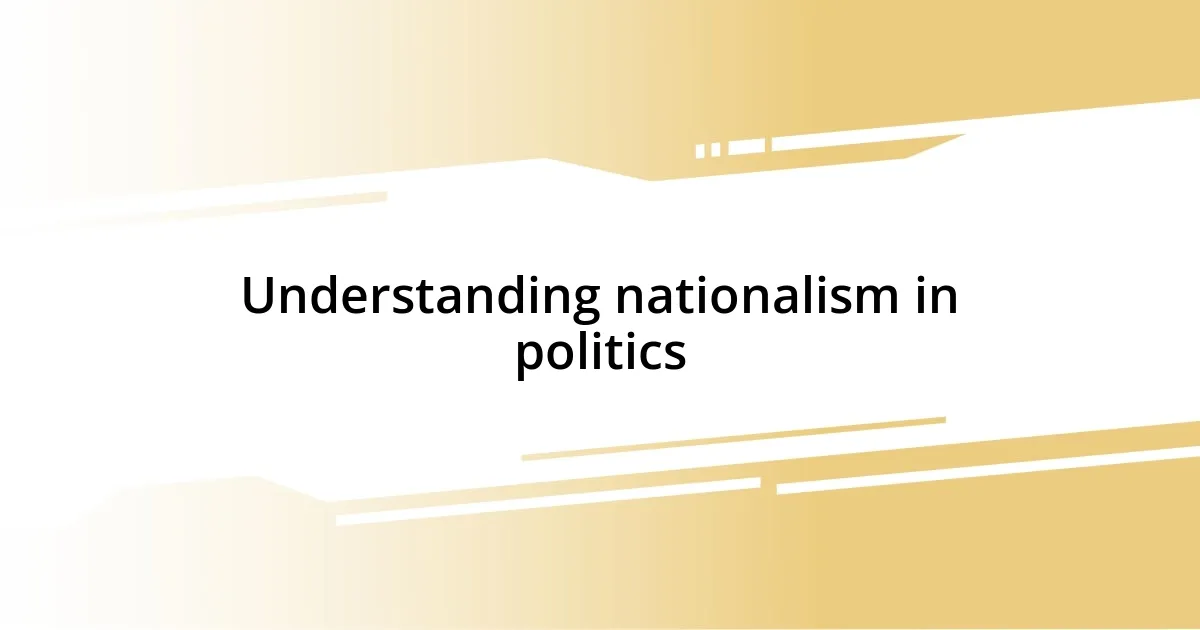
Understanding nationalism in politics
Nationalism in politics revolves around the idea of a shared identity among people, often based on culture, language, or history. I remember a time during a community gathering where people passionately spoke about what it meant to be part of our nation. That moment made me realize how powerful a collective identity can be, sometimes overshadowing individual interests.
When I reflect on nationalism, I can’t help but think about its dual nature. On one hand, it can unite people and foster pride, while on the other, it can lead to exclusion and conflict. How often have we seen people rally together during times of crisis, only for that sense of unity to dissolve into divisiveness later? It’s a fine line that many countries navigate, and it’s something I feel deeply impacts global relationships.
Nationalism also shapes political agendas and policies, often prioritizing national interests over global cooperation. During my travels abroad, I noticed how each country has its own narratives about their identity and values, sometimes at odds with neighboring nations. This interplay of national pride and global concern raises the question: How do we find a balance that respects our differences while promoting unity? That’s a challenge that continues to resonate with me as we try to connect across borders.
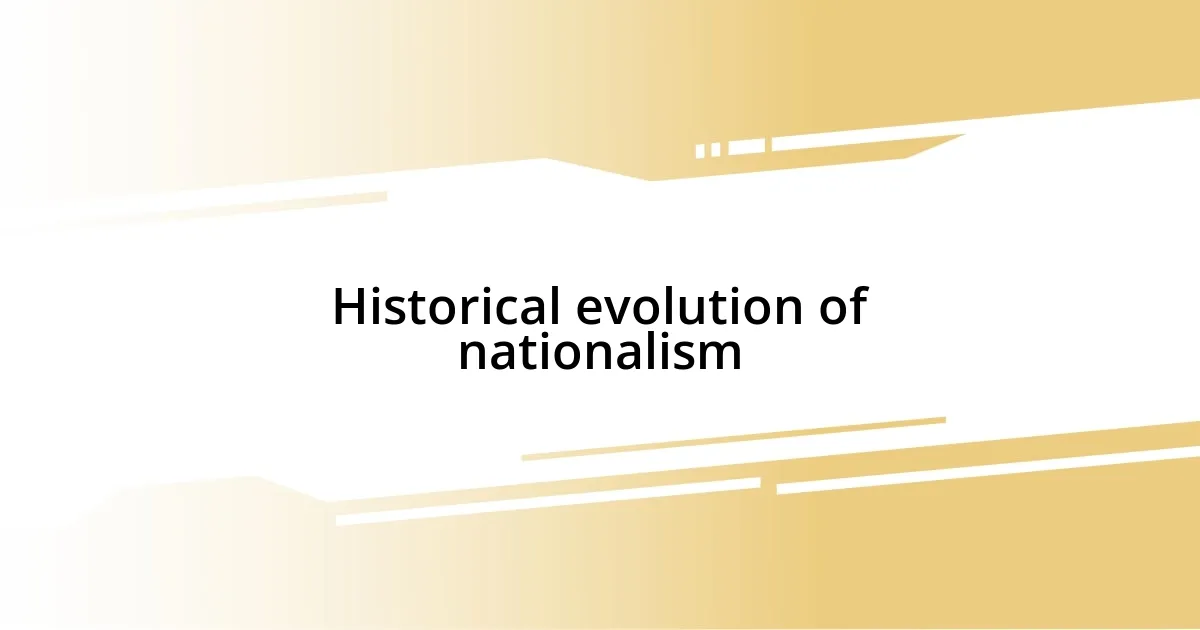
Historical evolution of nationalism
The historical evolution of nationalism is a fascinating journey that reflects humanity’s quest for identity and autonomy. In its early forms, nationalism emerged during the late 18th century, particularly in the wake of the American and French Revolutions. I vividly remember discussing these revolutions in a history class and being struck by how they not only sparked change in their own countries but also inspired movements across Europe, where people began to see themselves as part of larger national narratives rather than just subjects under monarchies.
- Nationalism became prominent in Europe during the 19th century, coinciding with the rise of nation-states.
- The unification of Italy and Germany underscored this trend, as diverse principalities came together under a shared identity.
- The two World Wars intensified nationalist sentiments, often resulting in devastating consequences, yet also fostering new nations and identities post-war.
- In the modern age, nationalism has shifted again, often blending with global phenomena, illustrating the complex interplay between local pride and global interconnectedness.
Reflecting on this evolution, I find it intriguing how nationalism has shifted in methods and significance over time. For instance, I recall being in a vibrant celebration during a national holiday, where the streets were filled with the sounds of traditional music, reminding me how these celebrations can serve as a collective memory. Yet, as I looked around, I also felt a bittersweet tension—a recognition that not everyone feels included in such celebrations. It highlights the dual-edged nature of nationalism; it can build community, yet it can simultaneously exclude those who do not share the same heritage or viewpoint.
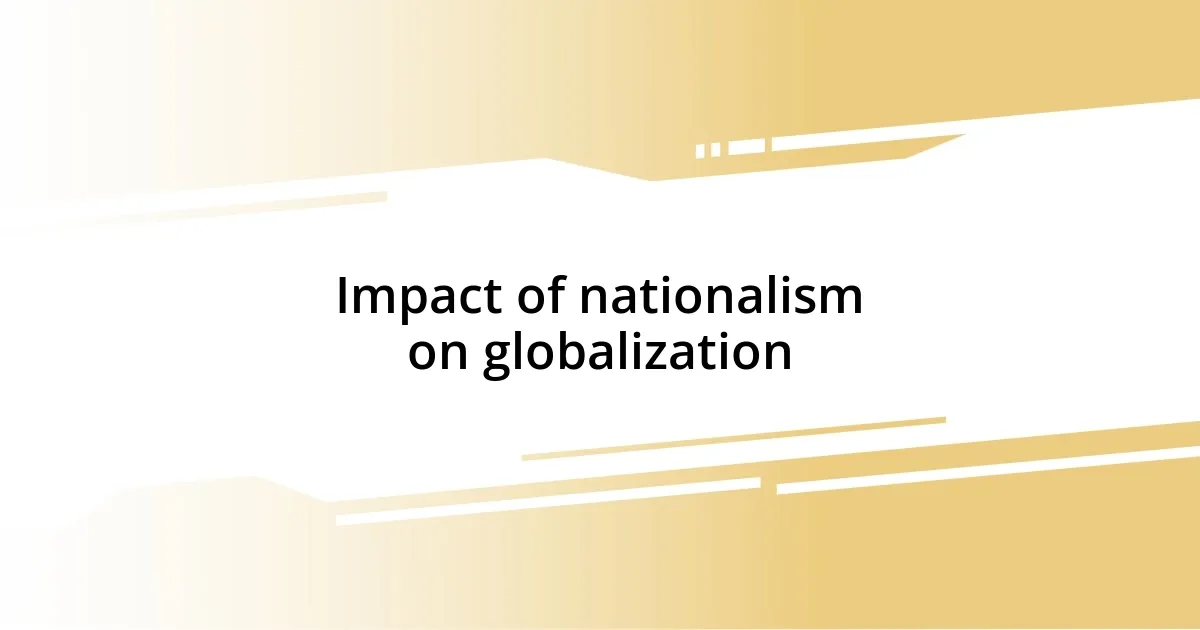
Impact of nationalism on globalization
Nationalism significantly impacts globalization by often prioritizing local interests over global cooperation. I’ve seen this firsthand when discussing trade policies with friends from different countries. Their concerns typically revolve around how national industries might suffer due to international competition, revealing a protective instinct that comes from a desire to support local jobs. This protective stance can lead to trade barriers, impacting economic interdependence which globalization thrives on.
In my view, nationalism can act as a double-edged sword in the context of globalization. On one side, it fosters loyalty and commitment to local culture, enriching the tapestry of the global market. I remember attending a festival that celebrated local artisans, and I felt a genuine pride for their craftsmanship. However, this same pride can also result in resistance to foreign ideas and products, stunting innovation. It’s fascinating how this dynamic plays out across various cultures.
When nationalism and globalization collide, the result can be a tumultuous balancing act. While I was studying abroad, I often noticed how students from different backgrounds rallied together, yet some lingering sentiments of nationalism created tension in discussions about shared governance. This experience underscores the necessity of understanding one another’s perspectives to navigate both national pride and global interconnectivity.
| Aspect | Nationalism | Globalization |
|---|---|---|
| Focus | Local interests and identity | Global connectivity and trade |
| Impact on Trade | Often protectionist, creating barriers | Encourages free trade and economic interdependence |
| Cultural Exchange | Emphasizes local culture | Facilitates exchange of ideas and innovation |
| Political Climate | Can foster isolationism | Promotes collaboration across borders |

Nationalism’s role in current conflicts
Nationalism often serves as a catalyst in current conflicts, as I’ve observed in various geopolitical struggles. Take the tensions in Eastern Europe, for example; national pride can easily escalate into discord when one group perceives its identity as threatened by another. I remember hearing a heated debate among friends who were split on issues related to national sovereignty versus regional cooperation, which made me realize how deeply rooted these feelings can be.
In places where national identity is intertwined with historical grievances, the repercussions can be profound. I once attended a conference where speakers from different countries passionately discussed their narratives around identity, and it struck me how quickly those discussions turned contentious. It’s as if recalling past injustices ignited a fire of emotions, reminding us that nationalism can both unify and divide. Can national identities ever reconcile with a shared future? My experience suggests it’s challenging, as the scars of history often linger longer than we anticipate.
The impact of nationalism on armed conflicts is probably one of the most alarming aspects I’ve encountered. During my travels, I visited a region where the local community was grappling with a separatist movement. The palpable tension in the air was haunting; people feared not just for their safety but for their cultural identity. This made me realize that when nationalism turns aggressive, it can morph into an all-consuming force, overshadowing any hope for peace and cooperation. So what does this mean for the future of global politics? I believe it’s imperative to foster dialogues that embrace both identity and understanding, to counterbalance the polarizing effects of nationalism in a world that desperately needs unity.
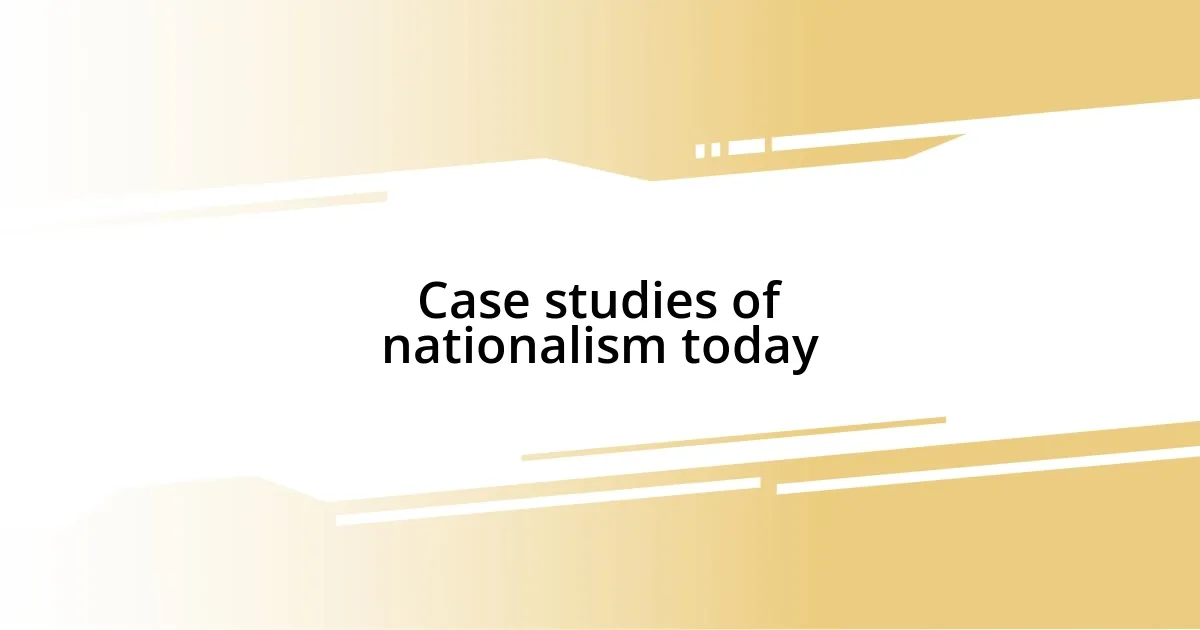
Case studies of nationalism today
Nationalism manifests vividly in various contemporary contexts. For instance, during my time in Catalonia, I witnessed a passionate separation movement where locals expressed a yearning for independence from Spain. The deep emotion surrounding their cultural identity struck me at a demonstration where people proudly waved their flags and recounted stories of their heritage. It made me wonder—how does this sense of belonging shape civic engagement and political action in nations around the world?
In another striking case, I found myself deeply moved at a public rally in the heart of India. There, citizens passionately defended their national identity against perceived threats from globalization. The sense of unity was palpable, yet I couldn’t help but feel the underlying tension as some voices advocated for exclusion rather than inclusion. This experience raised a question in my mind: Can the powerful force of nationalism coexist harmoniously with global cooperation, or will it always rally divisions amid shared goals?
Lastly, I observed a compelling instance of nationalism during a visit to the United Kingdom around Brexit. The differing opinions among friends about leaving the EU revealed a spectrum of feelings tied to national identity. Some were exuberant about reclaiming sovereignty, while others feared losing the benefits of cooperation. This stark contrast made me ponder how deeply our national narratives influence our decisions, shaping not just political landscapes, but our very relationships with one another. Isn’t it fascinating how our connection to a place can sway our perspectives on broader issues?
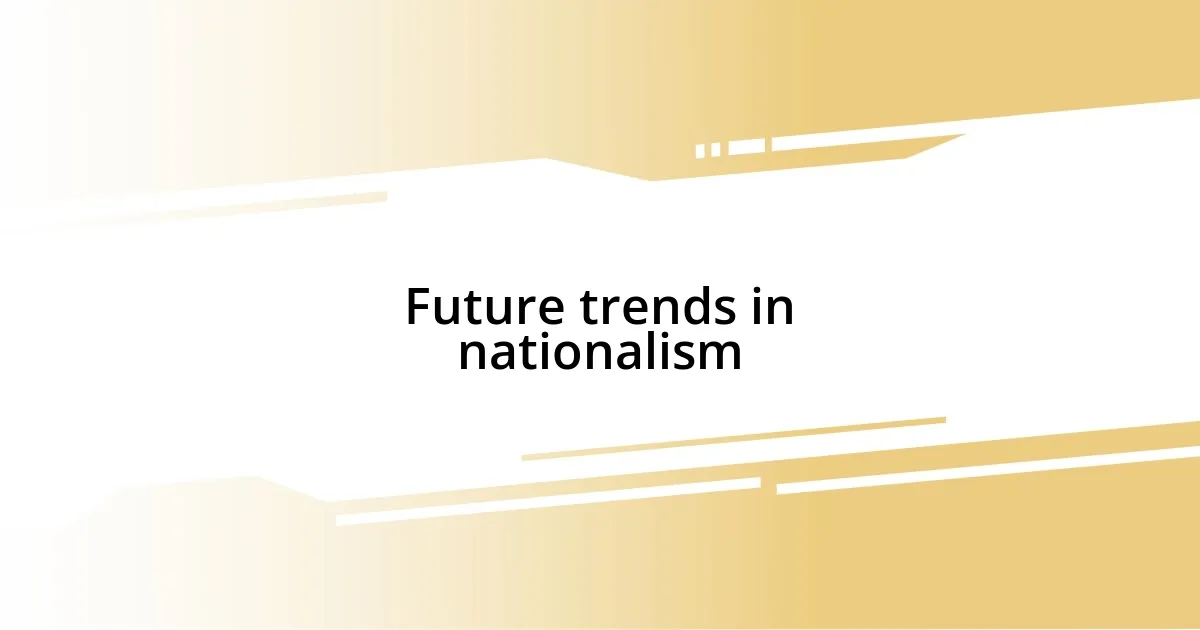
Future trends in nationalism
The future of nationalism seems poised for transformation as technology continues to weave our lives together, yet also heightens local identities. I saw this in action during a recent visit to a tech conference where discussions about digital communities emerged. Many attendees felt that while global connectivity could weaken traditional nationalism, it simultaneously gave rise to new forms of identity tied to online spaces. Isn’t it intriguing how our sense of belonging can be both expanded and restricted by virtual connections?
Moreover, I wonder if increased migration will bring nationalism into sharper focus. I recall a conversation I had with a friend who, having moved countries, felt torn between cultures. It made me reflect on how nationalism will likely shift towards more embracing definitions of identity. People may start to redefine what it means to be part of a nation, creating a blend of tradition and modernity. Can we envision a world where national pride coexists with global solidarity?
Looking ahead, the intersection of nationalism with environmental concerns also captivates my thoughts. Having participated in local climate activism, I felt the palpable desire for nations to prioritize their own citizens while collaborating on global issues. This duality could drive nationalistic sentiments to align with broader, universal causes, but also risk creating tension among nations with differing priorities. How will this tug-of-war shape the geopolitical landscape in the coming years? It’s a compelling question that invites us to explore the evolving nature of identities in a world that is both divided and interconnected.
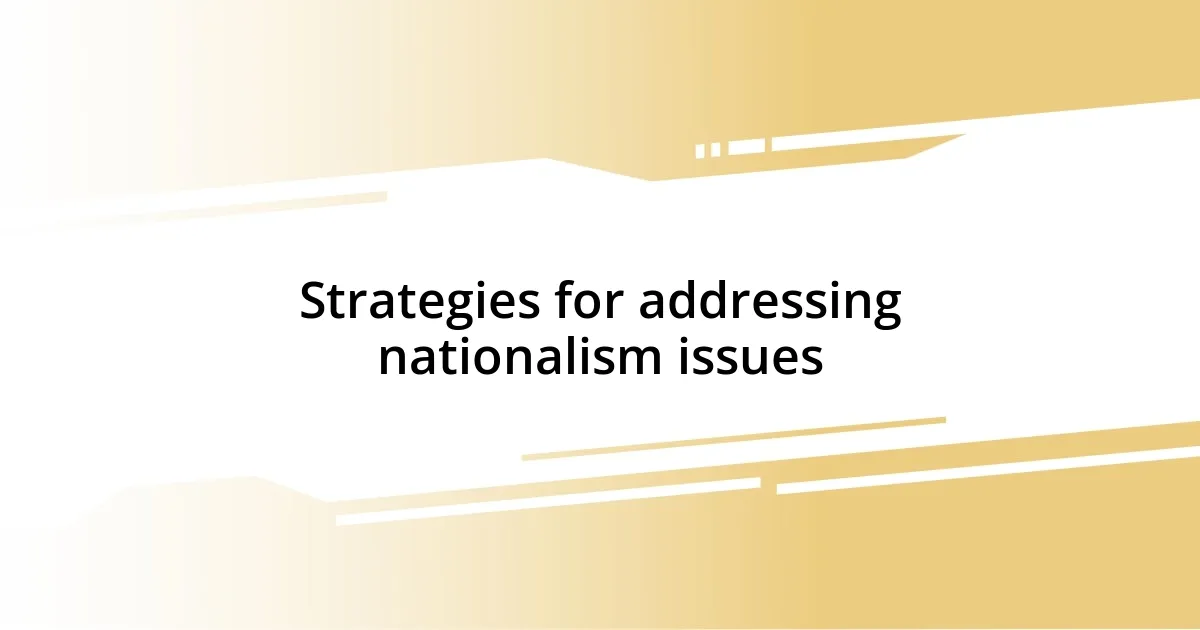
Strategies for addressing nationalism issues
Addressing nationalism issues requires a multi-faceted approach. One strategy I’ve seen effective is fostering inclusive dialogue among diverse groups. I remember a workshop I attended where participants from different political backgrounds came together to share their narratives. It was eye-opening to witness how listening could bridge divides—everyone left feeling a sense of understanding, even if agreement wasn’t reached. Isn’t it powerful how dialogue can dismantle barriers?
Education also plays a critical role in mitigating the negative aspects of nationalism. I’ve volunteered in programs designed to teach young people about global citizenship, emphasizing empathy and intercultural respect. Watching students engage in projects that celebrate diversity left me optimistic about the future. What if we all invested in education that highlights our shared humanity rather than our differences?
Additionally, promoting local initiatives that celebrate regional cultures can serve as a remedy for exclusionary nationalism. I once participated in a community festival showcasing local arts, cuisines, and traditions, and it was incredible to see people from all walks of life come together. This sense of local pride can coexist with appreciation for global diversity. Could we consider such events as vital tools in nurturing a more harmonious global society?








